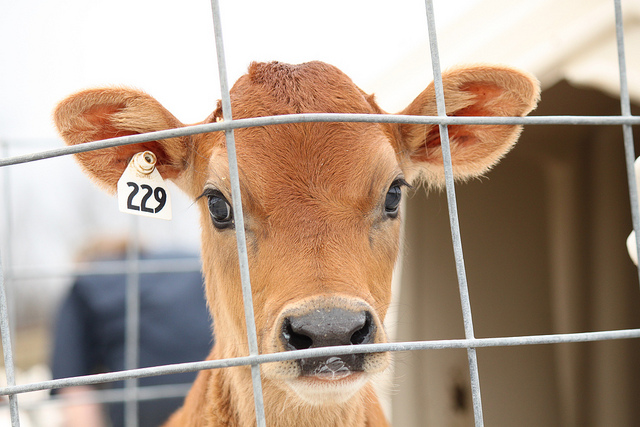I eat meat and I also teach yoga.
Some people in the yoga community may see this as completely ridiculous and many vegans will likely conclude that I am violating the yogic principle of ahimsa and boycott my classes.
I am okay with this and am writing this simply to offer my perspective. I am not trying to convince people to eat animal products in this article. I firmly believe that it is possible to obtain animal products in a conscious, spiritual and sustainable manner which is vastly different to how these products are attained in modern society.
As a society, our goal should be to raise our awareness about where our food is coming from. By doing so we can re-establish the myriad of healthy symbiotic relations between humans and nature, which were much more prevalent in the past.
How I Interpret Ahimsa (Non-Violence).
Ahimsa is the first of the yogic code of ethics and is typically translated to mean “non-violence.” It is commonly referred to as the moral reason preventing those who subscribe to yogic philosophy from consuming animal products. Ahimsa has also been translated to mean “non-suffering.” Non-suffering to me means not causing pain to other sentient beings such as animals. I agree with what most vegans are well aware of; that the meat industry causes tremendous suffering to animals. I am in no way supporting the inhumane treatment of animals which is rampant in factory produced animal products.
I do strongly believe, however that it is possible to obtain animal products without causing suffering to the animals. I believe that it is actually feasible to take the life of an animal in a conscious and spiritual manner. Although this practice is very rare in our world today, I do believe that as a species we have the potential to move toward this level of consciousness.
What “Conscious Killing” Would Look Like.
Imagine a small farm where animals were free to roam in beautiful green pastures. Picture a farmer who loves his animals and nurtures them with great compassion. The animals peacefully offer their milk and eggs in return for the care they receive. When it comes time to slaughter one of his flock, the farmer says a prayer blessing the animal. He thanks the earth for supporting the healthy growth of the animal and he thanks the animal for giving its life to support and sustain his family. This level of consciousness around animal slaughter is absolutely possible in my opinion, although it is nearly non-existent in our society today.
A Thought Experiment on Ahimsa.
Let me propose a hypothetical situation: let’s say that at some time in the future research were to come out that proved beyond any doubt that certain people need at least some animal products in their diet to maintain a healthy body. Now imagine that a vegan or vegetarian person were to look at this research and recognize that they were among those who need at least small amounts of animal products. If that person were to abstain from eating animal products, even though they had examined research which removed any ambiguity around the topic, wouldn’t that person be violating ahimsa? Wouldn’t that person be committing a violent act against themselves by depriving themselves of something that had been proven beyond perplexity to contribute to their vitality? I am not saying that this research exists, I’m simply offering this as a thought experiment.
Our Level of Consciousness is the Issue.
It is ridiculous to draw lines in the sand between which life forms we are okay with causing suffering to, and which life forms we are not.
The massive enslavement of the honey bee is a great example of this. Most vegans will say, “I don’t support that! I don’t eat honey.” Anyone who consumes products which need to be pollinated by honey bees are absolutely supporting suffering to bees on a massive scale. For example, 80 percent of the world’s almonds are produced in California fields pollinated almost exclusively by “slave bees,” so when we eat almonds, we’re most likely contributing to the suffering of bees. Fruitless Fall by Rowan Jacobsen goes into great depth on this topic, and I would suggest this book to anyone with is curious to learn more on the subject.
My point is that we cannot completely separate ourselves from our interactions with animals and other life forms. We have to learn to work with these life forms and re-establish the symbiotic relationships which are so prevalent in nature. The current situation with bees and the factory farming of animals are just two examples illustrating how far we have fallen from these healthy and sustainable symbiotic relationships with nature.
To me, a farmer who cares for and feeds an animal for its entire life, nurturing it when sick, and eventually taking its life to feed his family, is in no way causing suffering to that animal. The farmer and the animal have created a symbiotic relationship. What a beautiful thing! Instead of demonizing the meat industry, although describing it as demonic is certainly fair, we should focus on raising our awareness. By broadening our understanding of where our food is coming from, including our fruits and vegetables—many of which are factory farmed as well—we can move toward a world which really does practice ahimsa toward all beings, including plants!
Why I choose to Eat Meat.
I eat meat because I believe that from a nutritional standpoint, meat is absolutely necessary for me to maintain my health and vitality. This is the decision I have made for my body and I am not telling anyone else how they should nourish their body.
Everyone is different and for some people, a vegan or vegetarian diet might work well. Only the individual truly knows how they are feeling and if their diet and lifestyle is working for them. I did not write this to convince vegans or vegetarians to start eating meat. I am truly not trying to change anyone’s beliefs here. I am simply offering my perspective, as unpopular as it may be to certain people.
What I am saying is that as a species we need to become more conscious about our relationship to nature. If we choose to eat meat or any other animal products, we should be aware of where those products are coming from. We need to understand how the animal was treated throughout its life and especially how it was treated at the moment of its death.
When we can cultivate this level of awareness, we can heal our relationship to nature and create sustainable and symbiotic relationships with her. If we can do this, those among us who realize that our bodies are supported and nourished by animal products can still enjoy a steak every once in awhile, even if we do subscribe to the yogic philosophy.
~
Author: John Miller
Image: egrego2/Flickr
Apprentice Editor: Elyse Sinclair; Editor: Catherine Monkman








Read 43 comments and reply